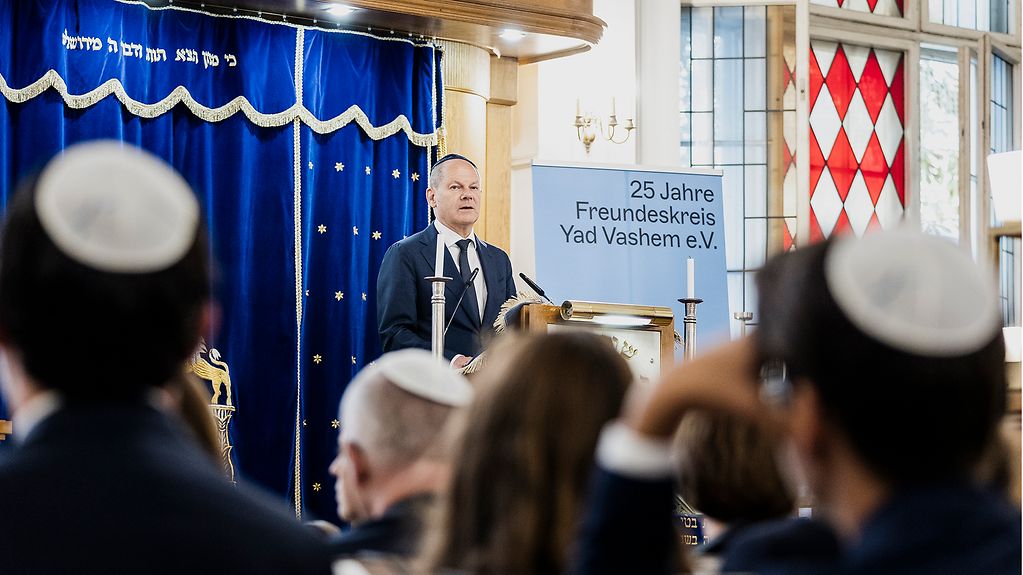Holocaust commemoration
“It is our duty to promote and protect Jewish life.” Federal Chancellor Olaf Scholz had cautionary words in the light of growing anti-Semitism and the relativisation of the Holocaust. The occasion was the commemorative event “25 Years of the Friends of Yad Vashem in Germany” on Sunday.
3 min reading time

Kanzler Scholz dankte in seiner Rede dem jüdischen Freundeskreis Yad Vashem für seine wichtige Arbeit.
Photo: Bundesregierung/Gaertner
In his speech at the Joachimsthaler Strasse Synagogue in Berlin, Scholz emphasised the ongoing obligation to ensure the memory of the countless victims was kept alive in the present day. Every single individual mattered, he said. “No name is to be forgotten,” said the Federal Chancellor, “nor the sheer scale of the mass murder of millions.”
The National Socialists and their helpers had inflicted deep wounds that still caused pain to the families of the survivors and the dead to this day. "We are all the more fortunate to have places like this synagogue in the very heart of Berlin and to have Jewish culture in Germany,” said Scholz.
Friends’ association makes vital contribution
The German association of friends of the Israeli memorial Yad Vashem was important, said the Federal Chancellor, because it helped make loss and suffering visible and keep memories alive in the present. This would ensure that the spirit of “Never again!” would endure in the future, too, said Scholz, adding that the friends’ association made a vital contribution to the fight against anti-Semitism, right-wing extremism and racism.
Federal government supports projects
Federal Chancellor Olaf Scholz made reference to the Young People Remember programme, noting how it focused particularly on memorial sites dedicated to the victims of National Socialism and NS documentation centres in Germany, supporting them in developing and expanding innovative educational formats that were aimed at young people, as well as actively involving them. International dialogue among young people was very important too, said Scholz. He noted that there were concrete plans to launch a German-Israeli youth organisation.
With its programme "Live Democracy!", the Federal Government had established a nationwide competence network to combat anti-Semitism, said Scholz, financing numerous projects dedicated to the prevention of anti-Semitism as well as setting up counselling offices for those affected at state democracy centres in all federal states.
Need for action
“Anti-Semitism and racism are on the rise,” said the Federal Chancellor. "The figures are alarming – they indicate an urgent need for action.” Last year, the number of anti-Semitic crimes in Germany had risen to 3,027, he said, an increase of almost 30 percent over the previous year. “We can only combat this if we work together – politicians who are willing to act and a committed civil society,” said Scholz.
Relativisation of the Holocaust not to be tolerated
“We will not tolerate any relativisation of the Holocaust,” Olaf Scholz stressed. The killing of six million people had no parallel in history, he said. Anyone who questioned this – making false comparisons, trivialising and falsifying history – was inciting hatred and violence, and also mocking the victims. “We made that unmistakably clear to the Palestinian leadership after Mahmoud Abbas’ outrageous faux pas here on German soil,” said the Federal Chancellor.
Protection for Holocaust survivors
Scholz stressed that in Germany, Holocaust survivors from Ukraine would find shelter and protection from the war. 94 of them had already arrived here, he said. In this connection, Federal Chancellor talked about the fate of Boris Romantschenko. “Romantschenko was himself a forced labourer and prisoner,” said Scholz. “He never tired of bearing witness to what he had experienced as a forced labourer and prisoner in the Nazi concentration camps. He died in Kharkiv on 18 March – a victim of Russian bombs.”
Romantschenko exemplified numerous members of the Jewish community in Ukraine, said Scholz, who had spent their lives as young people in constant fear of terror and death at the hands of the Nazi occupiers and their henchmen, and who today, almost a lifetime later, were again having to fear war, bombs and occupation. “The thought is almost unbearable,” said Federal Chancellor Olaf Scholz.
The German Yad Vashem friends’ association has set itself the task of raising public awareness of the work being done by the World Holocaust Remembrance in Jerusalem. To this end, the association not only strengthens relations between countries, it also organises a wide range of educational and commemorative programmes in collaboration with Yad Vashem.
The Yad Vashem memorial is dedicated to documentation, research, education, and commemoration of the six million Jewish people murdered during the Holocaust.